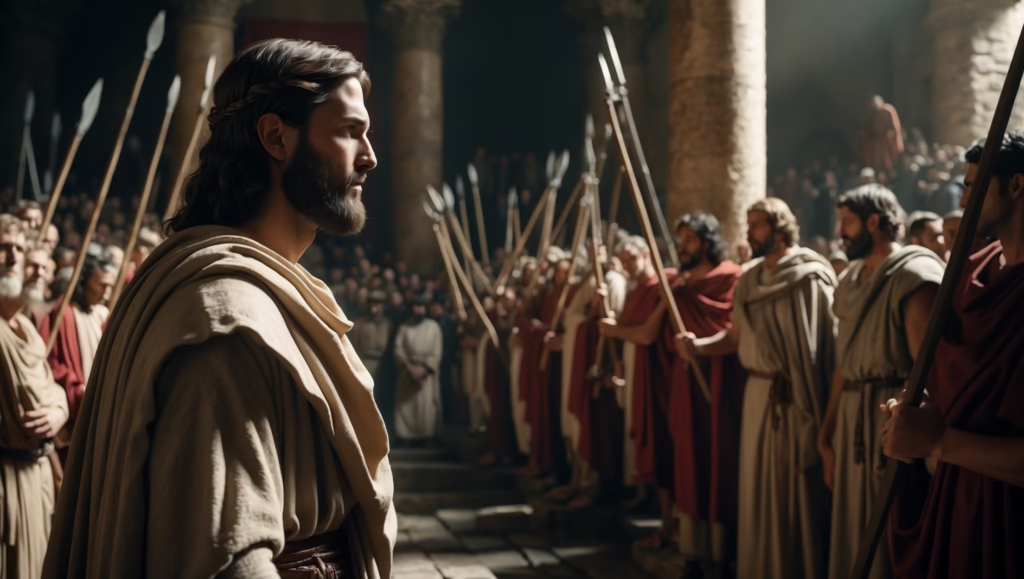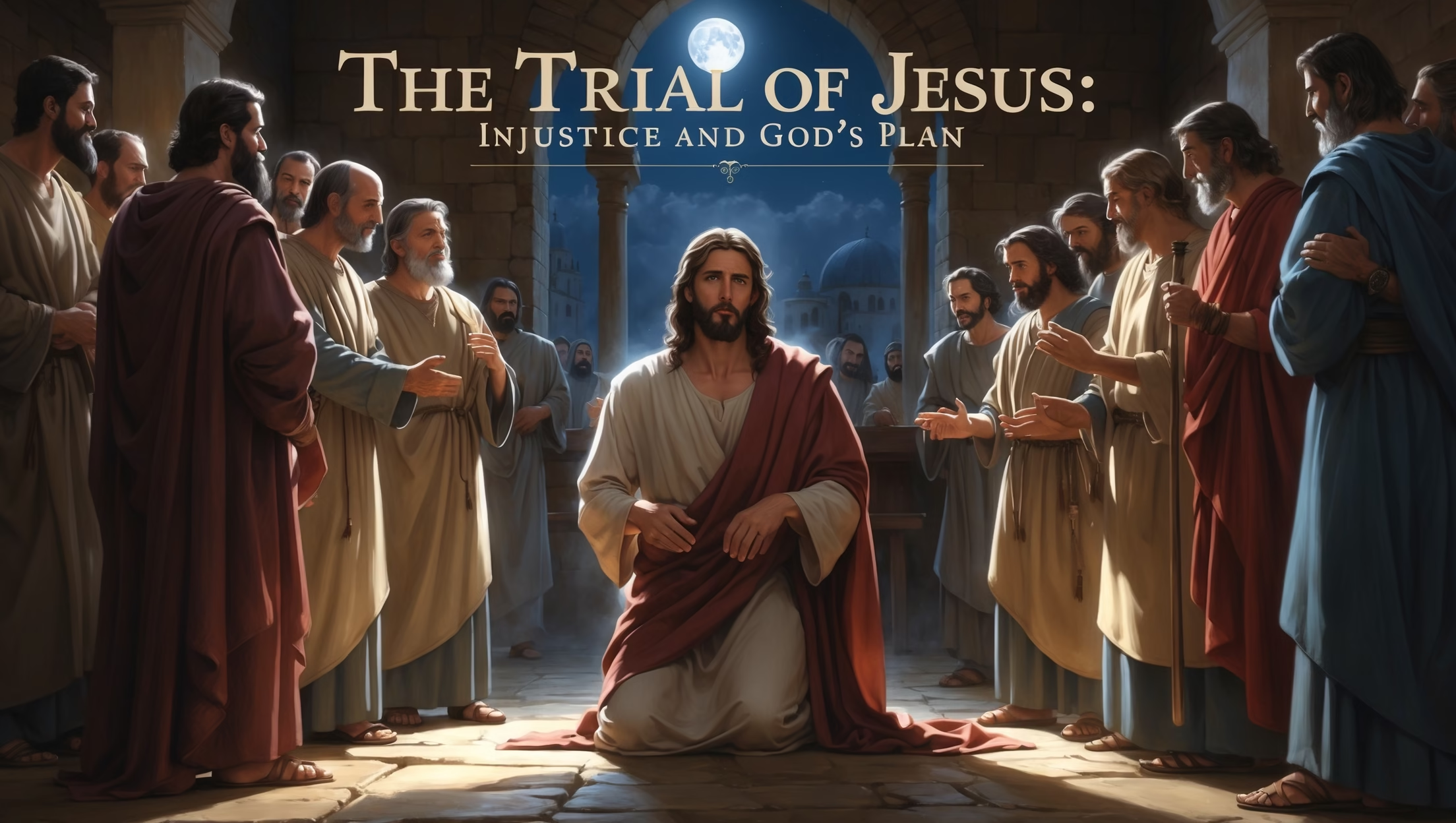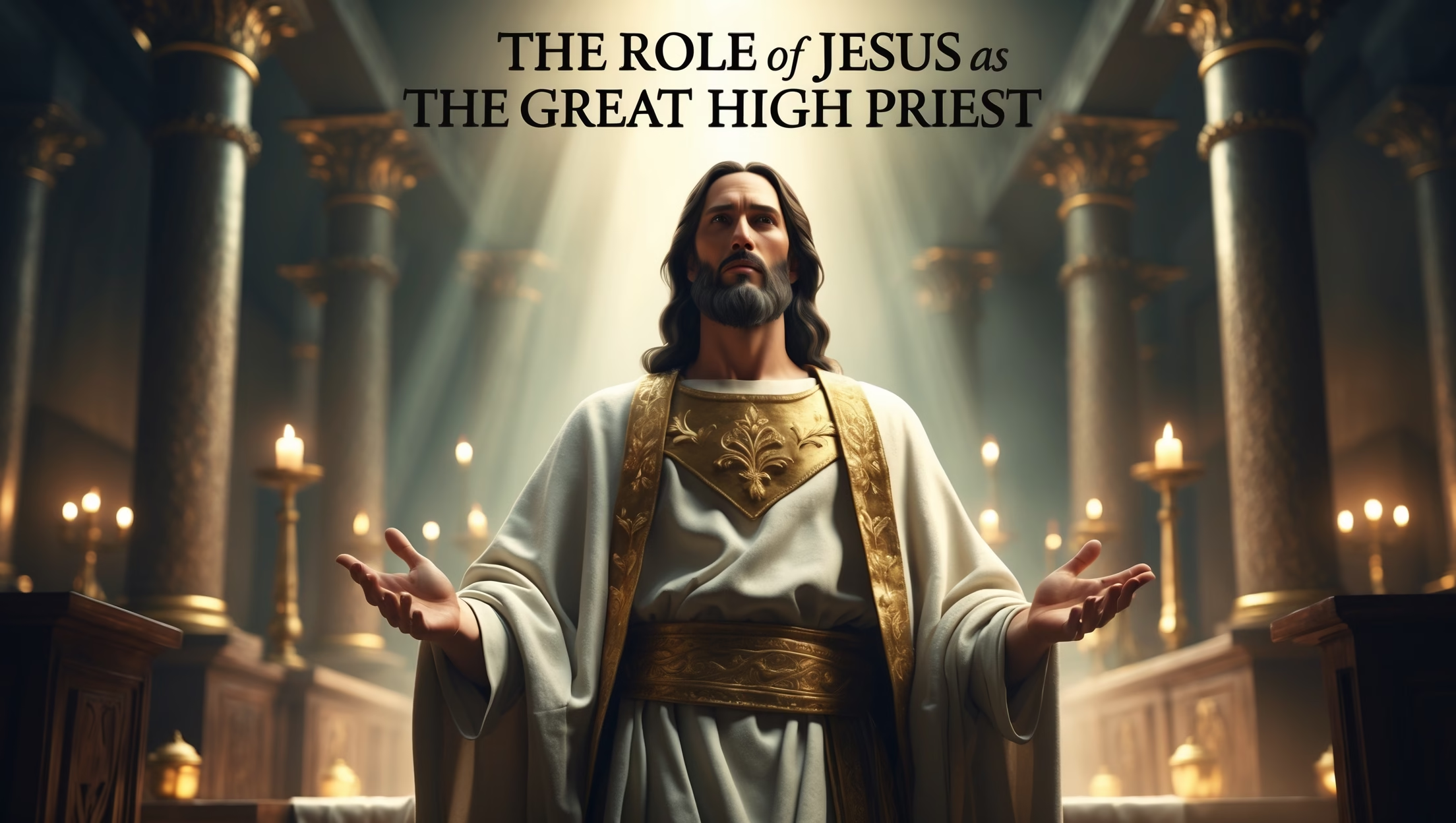Introduction
The trial of Jesus stands as one of the most infamous and unjust events in human history. What should have been a process of truth-seeking and justice quickly devolved into a spectacle of lies, manipulation, and political pressure. Jesus, the innocent Son of God, endured accusations and condemnation despite being without fault. Yet, as paradoxical as it may seem, this miscarriage of justice was the very means through which God’s plan of salvation was accomplished. The trial of Jesus, though corrupt in every human sense, became the stage where divine justice and mercy met.

The Jewish Trial: Jesus Before the Sanhedrin
The first phase of the trial began when Jesus was arrested in the Garden of Gethsemane. Under the cover of night, He was taken to the high priest’s residence, where the Jewish council, the Sanhedrin, convened. By their own law, Jewish trials were not permitted at night or during feast days, yet in their haste and determination to silence Him, the leaders broke their traditions.
The charges brought against Jesus were not legal but theological. The Sanhedrin accused Him of blasphemy for declaring that He was the Son of God. To strengthen their case, they summoned false witnesses, yet even their testimonies could not agree. The trial was riddled with inconsistencies and irregularities, but the religious leaders were determined to find a reason to condemn Him. Jesus’ claim of divine authority was seen as an intolerable threat to their power and control.
At this stage, the trial of Jesus before the Sanhedrin reveals both the depth of human corruption and the fulfillment of prophecy. Isaiah had foretold that the Messiah would be despised and rejected, a man of sorrows acquainted with grief. The council’s determination to condemn Him, despite the lack of evidence, was not merely a legal decision—it was the outworking of a hardened spiritual blindness.
The Roman Trial: Jesus Before Pilate
After the Jewish leaders had condemned Him, they brought Jesus before the Roman governor, Pontius Pilate. Unlike the Sanhedrin, Pilate was not concerned with religious blasphemy; his role was to maintain political stability in Judea. The accusations therefore shifted. Instead of blasphemy, Jesus was charged with claiming to be a king, a potential challenge to Roman authority.
Pilate, however, quickly saw through their manipulation. In examining Jesus, he found no fault in Him. The governor’s repeated declarations of innocence echo throughout the Gospels: “I find no basis for a charge against Him.” Yet despite recognizing His innocence, Pilate was caught between justice and politics. The Jewish leaders stirred the crowd into a frenzy, demanding crucifixion, and threatening Pilate’s loyalty to Caesar if he did not comply.
In one of the most tragic compromises of conscience, Pilate washed his hands before the people, symbolizing his attempt to absolve himself of responsibility, while ultimately handing Jesus over to be crucified. The Roman trial of Jesus shows how political pressure and fear of man can overcome truth and justice.
The Silence of Jesus
One of the most striking aspects of both trials is the silence of Jesus. Though He spoke a few words, for the most part, He did not defend Himself against the false accusations. This silence was not weakness but strength. It fulfilled the prophecy of Isaiah 53, which described the suffering servant as “like a sheep before its shearers is silent, so He did not open His mouth.”
Jesus’ silence displayed His trust in the Father’s sovereign plan. He could have called upon legions of angels to defend Him, yet He chose submission instead. His quiet dignity in the face of lies and brutality revealed His unshakable commitment to God’s redemptive mission. His silence also exposed the futility of the accusations—truth needs no frantic defense when it stands secure in the hands of God.
God’s Sovereignty in Injustice
From a human perspective, the trial of Jesus was nothing but injustice. False witnesses were heard, political expediency triumphed over truth, and an innocent man was condemned to death. Yet from the divine perspective, nothing happened outside of God’s sovereign plan. Peter would later proclaim in Acts 2:23 that Jesus was handed over “by God’s deliberate plan and foreknowledge.”
The cross was not an accident, nor was it simply the tragic result of corruption. It was the very means through which God accomplished salvation for humanity. In the worst act of human injustice, God brought forth the greatest act of divine justice: the forgiveness of sins. The trial and crucifixion of Jesus remind us that God can bring redemption even from humanity’s darkest deeds.
Lessons for Today
The trial of Jesus continues to speak powerfully into our lives today. Many people experience injustice, whether in personal relationships, workplaces, or even legal systems. When faced with such situations, the story of Jesus encourages us to trust that God sees and knows our suffering. Though injustice may prevail for a time, it is never outside of God’s control.
Jesus’ silence teaches us the strength of trusting in God rather than relying on self-defense or retaliation. His endurance shows that God can transform wrongful suffering into a source of redemption and glory. For believers, the trial of Jesus offers comfort: if God could turn the most unjust act in history into the greatest triumph, He can also work His purposes through our struggles.
Conclusion
The trial of Jesus was a scene of corruption, manipulation, and injustice. The Jewish council broke their own laws, Pilate surrendered truth to political pressure, and the crowds demanded the death of the innocent. Yet, within this miscarriage of justice, God’s plan of salvation was unfolding. The cross was not a defeat but a victory, where Jesus’ sacrifice accomplished the forgiveness of sins for all who believe.
The trial of Jesus reminds us that God’s sovereignty reigns even in the midst of injustice. It calls us to trust in His plan, to endure with faith, and to recognize that His justice and mercy prevail in ways beyond human understanding. What seemed like the darkest day in history became the brightest dawn of hope, as the innocent one bore the punishment of the guilty, so that all may find life in Him.










